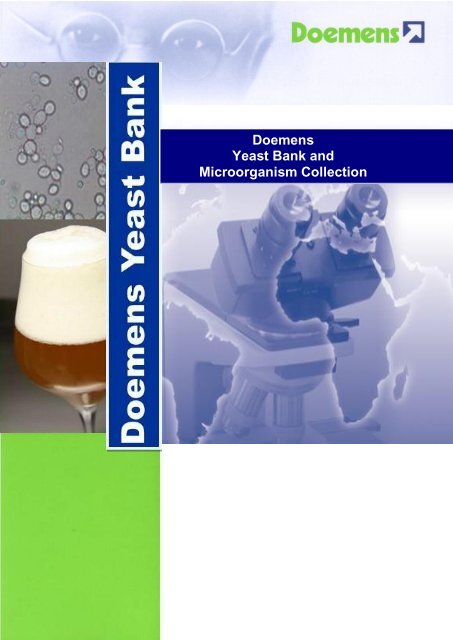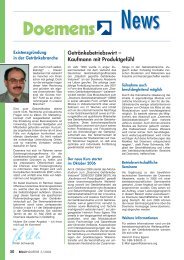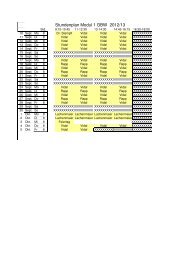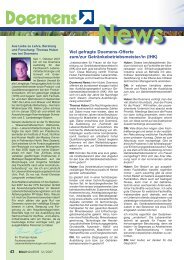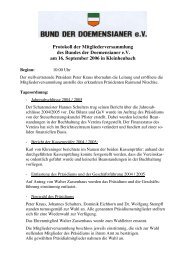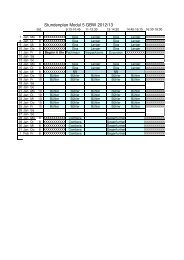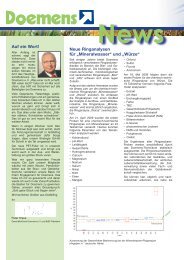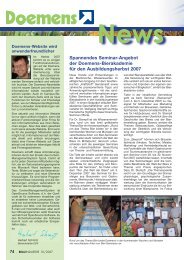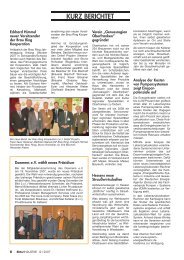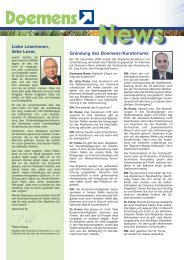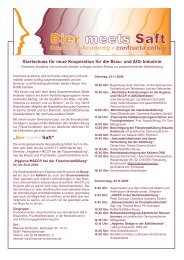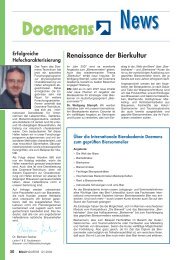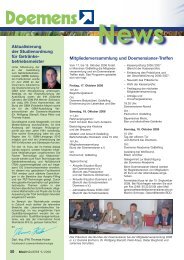Flocculating yeast - Doemens
Flocculating yeast - Doemens
Flocculating yeast - Doemens
Create successful ePaper yourself
Turn your PDF publications into a flip-book with our unique Google optimized e-Paper software.
<strong>Doemens</strong><br />
Yeast Bank and<br />
Microorganism Collection
Apart from the raw materials quality the <strong>yeast</strong> strain significantly affects the<br />
quality and the character of the final beer. Especially microbiological purity,<br />
consistent <strong>yeast</strong> quality and <strong>yeast</strong> vitality are essential parameters for quality<br />
management.<br />
Whether for micro breweries or larger industrial breweries – with our long<br />
lasting experience in the field of pure culture <strong>yeast</strong> strains and <strong>yeast</strong><br />
management we will assist you in finding the right <strong>yeast</strong> strain for especially<br />
your beer.<br />
The <strong>Doemens</strong> collection of microorganisms comprises pure-cultures of more<br />
than 90 <strong>yeast</strong> varieties and further culture organisms such as lactic acid<br />
bacteria for biological acidification. We are also glad to offer you a storage<br />
possibility for your strain as a “Backup” and supply you with freshly grown<br />
cultures of your <strong>yeast</strong> in regular intervals.<br />
Our customers may chose from following varieties of pure-culture strains:<br />
Bottom fermenting <strong>Flocculating</strong> <strong>yeast</strong>, Non-flocculating <strong>yeast</strong>,<br />
<strong>yeast</strong>s<br />
Pressure fermentation <strong>yeast</strong><br />
Top fermenting Wheat beer <strong>yeast</strong>, Pressure fermentation <strong>yeast</strong>,<br />
<strong>yeast</strong>s<br />
Kölsch <strong>yeast</strong>, Ale and Stout <strong>yeast</strong><br />
Lactic acid bacteria Lactobacillus delbrückii, Lactobacillus<br />
cultures<br />
amylovorus, more cultures upon request<br />
More strain cultures Upon request<br />
Price list:<br />
Pure culture from a pure<br />
strain<br />
460,00 €<br />
Yeast on cotton pad<br />
65,00 € + 11,00 € packaging +<br />
transport<br />
Slant agar culture<br />
78,00 € + 11,00 € packaging +<br />
transport<br />
Liquid culture (500ml)<br />
95,00 € + 14,00 € packaging +<br />
transport<br />
Bacteria culture 80,00 € + packaging+ transport<br />
All prices plus sales tax and shipping expenses.<br />
The shipment of the cultures will be approx. 2 weeks after the order receipt as<br />
every culture is freshly propagated. Furthermore prior to sending the <strong>yeast</strong> is<br />
checked to ensure that there is no contamination in the pure culture.
<strong>Doemens</strong> Dry Yeasts<br />
Dry <strong>yeast</strong> is a good alternative for smaller breweries which do<br />
not have their own <strong>yeast</strong> propagation or for breweries that do<br />
not produce regularly. Ordering dry <strong>yeast</strong> is a good possibility<br />
to obtain <strong>yeast</strong> in a ready-to-use format, in a consistent quality<br />
and with good storage abilities.<br />
Some strains of the <strong>Doemens</strong> Yeast strain Collection are now available in 500 g<br />
aluminium packs.<br />
Strain 308 (bottom fermenting <strong>yeast</strong>)<br />
Strain 308 is a bottom fermenting flocculating <strong>yeast</strong> with good sedimentation<br />
properties and a high attenuation degree. With it´s good fermentation properties<br />
and the well balanced aroma spectrum it is a popular and frequently used strain.<br />
During fermentation strain 308 produces SO2 at high levels leading to a good<br />
flavour stability and a decreased beer aging.<br />
Wheat beer <strong>yeast</strong> Strain 433<br />
The <strong>Doemens</strong> dried wheat beer <strong>yeast</strong> is a top fermenting <strong>yeast</strong> for the<br />
production of typical traditional Bavarian-style wheat beers with a well balanced<br />
fruity flavour.<br />
Nottingham Ale<br />
Quick start to fermentation in doing so the <strong>yeast</strong> reaches high attenuation rates.<br />
The aroma is slightly estery.<br />
BRY-97 American West Coast Yeast<br />
BRY-97 American West Coast Yeast is a flocculent strain. The aroma is slightly<br />
estery, almost neutral.<br />
Belle Saison Yeast<br />
Low flocculation rate. During fermentation, cooling is not normally used, allowing<br />
temperature of fermentation to increase. Aroma is fruity, spicy and peppery due<br />
to ester and phenol production.<br />
CBC-1 Cask And Bottle Conditioned Beer Yeast<br />
CBC-1 has been especially selected for it's refermentation properties and is<br />
recommended for Cask and Bottle Conditioning. CBC-1 referments beers up to<br />
12-14% ABV due to its high resistance to alcohol and pressure; it does not<br />
produce flavors therefore conserving the original character of the beer.<br />
CBC-1 can also be used for primary fermentation and is especially suitable for<br />
Champagne-like beers and fruit beers.<br />
Prices<br />
Aluminium packs dried <strong>yeast</strong> 433, 60,00 €<br />
Nottingham Ale, Bry-97 Ale and Belle<br />
Saison (500g)<br />
Aluminium packs dried <strong>yeast</strong> 308 90,00 €<br />
(500g)<br />
All prices plus applicable legal VAT and shipping.<br />
The delivery time is approx. 3 days after receipt of the order.<br />
For questions on the <strong>yeast</strong> bank or orders please contact:<br />
Thomas Huber or Dr. Andreas Brandl<br />
Tel.: +49 (0)89 / 85 805 – 23 Tel.: +49 (0)89 / 85 805 - 35<br />
Fax: +49 (0) 89 / 85 805 - 39<br />
E-Mail: hefebank@doemens.org<br />
14.03.2013 page 2
<strong>Doemens</strong> List of Strains<br />
Dry <strong>yeast</strong><br />
Stamm Hefetyp<br />
308 Bottom fermenting flocculating <strong>yeast</strong><br />
433 Top fermenting flocculating <strong>yeast</strong><br />
<strong>Flocculating</strong> <strong>yeast</strong> (bottom<br />
fermenting)<br />
Strain Yeast typ Slantagar<br />
0,5 l Liquid<br />
culture<br />
301 <strong>Flocculating</strong> <strong>yeast</strong> Yes Yes<br />
302 <strong>Flocculating</strong> <strong>yeast</strong> Yes Yes<br />
304 <strong>Flocculating</strong> <strong>yeast</strong> Yes Yes<br />
308 <strong>Flocculating</strong> <strong>yeast</strong> Yes Yes<br />
312 <strong>Flocculating</strong> <strong>yeast</strong> Yes Yes<br />
313 <strong>Flocculating</strong> <strong>yeast</strong> Yes Yes<br />
316 <strong>Flocculating</strong> <strong>yeast</strong> Yes Yes<br />
319 <strong>Flocculating</strong> <strong>yeast</strong> Yes Yes<br />
320 <strong>Flocculating</strong> <strong>yeast</strong> Yes Yes<br />
323 <strong>Flocculating</strong> <strong>yeast</strong> Yes Yes<br />
326 <strong>Flocculating</strong> <strong>yeast</strong> Yes Yes<br />
329 <strong>Flocculating</strong> <strong>yeast</strong> Yes Yes<br />
330 <strong>Flocculating</strong> <strong>yeast</strong> Yes Yes<br />
334 <strong>Flocculating</strong> <strong>yeast</strong> Yes Yes<br />
342 Bottom fermenting <strong>yeast</strong> for Lager Yes Yes<br />
344 <strong>Flocculating</strong> <strong>yeast</strong> Yes Yes<br />
345 <strong>Flocculating</strong> <strong>yeast</strong> Yes Yes<br />
346 <strong>Flocculating</strong> <strong>yeast</strong> Yes Yes<br />
351 <strong>Flocculating</strong> <strong>yeast</strong> Yes Yes<br />
352 <strong>Flocculating</strong> <strong>yeast</strong> Yes Yes<br />
355 <strong>Flocculating</strong> <strong>yeast</strong> Yes Yes<br />
363 Bottom fermenting <strong>yeast</strong> for Lager Yes Yes<br />
364 <strong>Flocculating</strong> <strong>yeast</strong> Yes Yes<br />
371 <strong>Flocculating</strong> <strong>yeast</strong> Yes Yes<br />
375 <strong>Flocculating</strong> <strong>yeast</strong> Yes Yes<br />
W 547 <strong>Flocculating</strong> <strong>yeast</strong> Yes Yes<br />
W 548 <strong>Flocculating</strong> <strong>yeast</strong> Yes Yes<br />
W 574 <strong>Flocculating</strong> <strong>yeast</strong> Yes Yes<br />
(marked <strong>yeast</strong> are frequently requested <strong>yeast</strong>s)<br />
14.03.2013 page 3
Non-flocculating <strong>yeast</strong><br />
(bottom fermenting)<br />
Strain Yeast typ Slantagar<br />
0,5 l Liquid<br />
culture<br />
310 Non-flocculating <strong>yeast</strong> Yes Yes<br />
314 <strong>Flocculating</strong> <strong>yeast</strong> Yes Yes<br />
370 <strong>Flocculating</strong> <strong>yeast</strong> Yes Yes<br />
W 521 Non-flocculating <strong>yeast</strong> Yes Yes<br />
(marked <strong>yeast</strong> are frequently requested <strong>yeast</strong>s)<br />
Pressure fermentation <strong>yeast</strong><br />
(bottom fermenting)<br />
Strain Yeast typ<br />
0,5 l Liquid<br />
Slantagar<br />
culture<br />
360 Pressure fermentation <strong>yeast</strong> Yes Yes<br />
DGH Pressure fermentation <strong>yeast</strong> Yes Yes<br />
(marked <strong>yeast</strong> are frequently requested <strong>yeast</strong>s)<br />
14.03.2013 page 4
Wheat beer <strong>yeast</strong> (bavarian style)<br />
Strain Yeast typ Slantagar<br />
0,5 l Liquid<br />
culture<br />
432 Wheat beer <strong>yeast</strong> Yes Yes<br />
433 <strong>Flocculating</strong> wheat beer <strong>yeast</strong> Yes Yes<br />
435 Wheat beer <strong>yeast</strong> Yes Yes<br />
436 Wheat beer <strong>yeast</strong> Yes Yes<br />
437 Wheat beer <strong>yeast</strong> Yes Yes<br />
439 Wheat beer <strong>yeast</strong> Yes Yes<br />
440 Wheat beer <strong>yeast</strong> Yes Yes<br />
448 Wheat beer <strong>yeast</strong> Yes Yes<br />
454 Wheat beer <strong>yeast</strong> Yes Yes<br />
465 Wheat beer <strong>yeast</strong> Yes Yes<br />
466 Wheat beer <strong>yeast</strong> Yes Yes<br />
476 Wheat beer <strong>yeast</strong> Yes Yes<br />
477 Wheat beer <strong>yeast</strong> Yes Yes<br />
478 Wheat beer <strong>yeast</strong> Yes Yes<br />
479 Wheat beer <strong>yeast</strong> Yes Yes<br />
480 Wheat beer <strong>yeast</strong> Yes Yes<br />
482 Wheat beer <strong>yeast</strong> Yes Yes<br />
(marked <strong>yeast</strong> are frequently requested <strong>yeast</strong>s)<br />
Kölsch <strong>yeast</strong><br />
Strain Yeast typ Slantagar<br />
0,5 l Liquid<br />
culture<br />
411 Top fermenting <strong>yeast</strong> for Kölsch<br />
und Altbier<br />
Yes Yes<br />
403 Kölsch <strong>yeast</strong> Yes Yes<br />
462 Kölsch <strong>yeast</strong> Yes Yes<br />
468 Kölsch <strong>yeast</strong> Yes Yes<br />
483 Top fermenting <strong>yeast</strong> for Kölsch<br />
und Altbier<br />
Yes Yes<br />
484 Kölsch <strong>yeast</strong> Yes Yes<br />
(marked <strong>yeast</strong> are frequently requested <strong>yeast</strong>s)<br />
14.03.2013 page 5
Top fermenting <strong>yeast</strong><br />
Strain Yeast typ Slantagar<br />
0,5 l Liquid<br />
culture<br />
494 Trappist <strong>yeast</strong> Yes Yes<br />
495 Belgian Witbier <strong>yeast</strong> Yes Yes<br />
496 Lambic <strong>yeast</strong> Yes Yes<br />
497 Lambic <strong>yeast</strong> Yes Yes<br />
O-57 Top fermenting <strong>yeast</strong> Yes Yes<br />
H 04 Top fermenting <strong>yeast</strong> Yes Yes<br />
W 557 Top fermenting <strong>yeast</strong> Yes Yes<br />
W 572 Top fermenting <strong>yeast</strong> Yes Yes<br />
Top fermenting <strong>yeast</strong> for pressure<br />
fermentation<br />
Strain Yeast typ Slantagar<br />
DGH-o Top fermenting <strong>yeast</strong> for pressure<br />
fermentation<br />
Altbier <strong>yeast</strong><br />
Strain Yeast typ Slantagar<br />
411 Top fermenting <strong>yeast</strong> for Kölsch<br />
und Altbier<br />
0,5 l Liquid<br />
culture<br />
Yes Yes<br />
0,5 l Liquid<br />
culture<br />
Yes Yes<br />
449 Altbier <strong>yeast</strong> Yes Yes<br />
453 Altbier <strong>yeast</strong> Yes Yes<br />
461 Altbier <strong>yeast</strong> Yes Yes<br />
483 Top fermenting <strong>yeast</strong> for Kölsch<br />
und Altbier<br />
Yes Yes<br />
486 Altbier <strong>yeast</strong> Yes Yes<br />
487 Altbier <strong>yeast</strong> Yes Yes<br />
489 Altbier <strong>yeast</strong> Yes Yes<br />
14.03.2013 page 6
Ale and Stout <strong>yeast</strong><br />
Strain Yeast typ Slantagar<br />
0,5 l Liquid<br />
culture<br />
406 Ale <strong>yeast</strong> Yes Yes<br />
438 Ale <strong>yeast</strong> Yes Yes<br />
473 Top fermenting <strong>yeast</strong> for Ale and<br />
Stout<br />
490 Top fermenting <strong>yeast</strong> for Ale and<br />
Stout<br />
491 Top fermenting <strong>yeast</strong> for Ale and<br />
Stout<br />
492 Top fermenting <strong>yeast</strong> for Ale and<br />
Stout<br />
Yes Yes<br />
Yes Yes<br />
Yes Yes<br />
Yes Yes<br />
493 Ale <strong>yeast</strong> Yes Yes<br />
For questions on the <strong>yeast</strong> bank or orders please contact:<br />
Thomas Huber or Dr. Andreas Brandl<br />
Tel.: +49 (0)89 / 85 805 – 23 Tel.: +49 (0)89 / 85 805<br />
- 35<br />
Fax: +49 (0) 89 / 85 805 - 39<br />
E-Mail: hefebank@doemens.org<br />
<strong>Doemens</strong> Academy GmbH<br />
Yeast Bank<br />
Stefanusstrasse 8<br />
82166 Gräfelfing / München<br />
14.03.2013 page 7
Brief description of widely<br />
used <strong>yeast</strong> strains<br />
Bottom fermenting <strong>yeast</strong> strains<br />
Non-flocculating <strong>yeast</strong><br />
Strain 310<br />
Beers produced with Strain 310 are well balanced and the<br />
<strong>yeast</strong> reaches high attenuation levels. The produced<br />
fermentation by-products give the beers a soft and smooth<br />
character. This <strong>yeast</strong> is perfect for the production of beers with<br />
a high attenuation degree (light beers). Preferably low<br />
fermentation temperatures should be applied.<br />
<strong>Flocculating</strong> <strong>yeast</strong><br />
Strain 301<br />
This <strong>yeast</strong> strain produces a balance flavour profile with the<br />
typical sulfite-<strong>yeast</strong>y note of Bavarian “Helles”.<br />
Strain 308<br />
Due to it´s well balanced flavour profile and the perfect<br />
fermentation properties this strain is ideal for the production of<br />
bottom fermented beers. The high SO2 production compared<br />
to other strains has positive effects to the flavour stability of<br />
the produced beers. Thus it is perfectly suited for “Pilsener”<br />
beers.<br />
Strain 375<br />
Strain 375 is the most frequently used bottom fermenting<br />
<strong>yeast</strong> strain in Germany. It gives a balanced flavour in<br />
combination with good fermentation properties. Other <strong>yeast</strong><br />
collections distribute it under a differing strain number.<br />
The technological properties are very similar to strain 308<br />
however it has a lower SO2 production.<br />
14.03.2013 page 8
Strain 316<br />
Due to it´s flavour profile this bottom-fermenting flocculent<br />
Strain is perfect for the production of smoked beers.<br />
Strain 329<br />
The flavour properties of strain 329 are similar to strain 375.<br />
However its flocculation is weaker compared to strain 375<br />
Strain 320<br />
This strain is perfectly suited for lower and moderate<br />
fermentation temperatures. The flavour profile of the beers is<br />
similar to beers produced with strain 308. Concerning the soft<br />
character of the produced beers this strain is very good for the<br />
production of the beer type “Munich Dark”.<br />
Strain 352<br />
Strain 352 can be compared to strain 308. The <strong>yeast</strong> is suited<br />
for full-bodied beers and shows good clarifying properties.<br />
Strain 360<br />
This Strain has a fast <strong>yeast</strong> growth, good pH-drop and<br />
reaches high attenuation levels. The beers produced with the<br />
strain show a good balanced flavour profile.<br />
14.03.2013 page 9
Bavarian wheat beer <strong>yeast</strong><br />
Stamm 439<br />
The strain 439 produces a balanced clove and banana flavour,<br />
with a hint of other fruit notes. The aroma intensity of this<br />
strain is located between the strains 476 and 479.<br />
Strain 476<br />
The strain 476 produces a balanced flavour profile with notes<br />
of clove and banana. The produced beers show the balanced<br />
and typical aromatic taste of Bavarian wheat beers. Due to it´s<br />
good fermentation properties (high <strong>yeast</strong> growth and<br />
fermentation) these strain is the most frequently used bavarian<br />
wheat beer strain. Other <strong>yeast</strong> collections provide it under a<br />
different name.<br />
Strain 479<br />
This is a breed of strain 476. It has similar fermentation<br />
properties with a higher ester production which pronounces<br />
the fruity flavour of the beer (banana flavour).<br />
Kölsch <strong>yeast</strong><br />
Strain 462<br />
This strain gives the beer a typical fruity Kölsch character. Due<br />
to its good alcohol tolerance alcohol value till 16 ABV are<br />
possible.<br />
Strain 484<br />
This strain produces the typical, light fruity Kölsch flavour. The<br />
strain showes a high fermentation speed in combination with<br />
very good attenuation degrees.<br />
Alt <strong>yeast</strong><br />
Strain 461<br />
This typical Alt beer Strain produces beers with slightly fruity<br />
top fermenting character.<br />
14.03.2013 page 10
Special<br />
Top-fermenting<br />
Yeast Strains<br />
Lower Rhine Ale Yeast:<br />
This strain produces less ester flavour. By variation of the fermentation<br />
temperature the flavour spectrum of the beer can be influenced.<br />
Cold fermentation temperature lead to lager beer character<br />
including SO2 .<br />
Higher fermentation temperature can cause more fruity beers.<br />
Because of the non-flocculent character of <strong>yeast</strong> the beer matures<br />
rapidly as well at cold temperatures.<br />
Fermentation temperatures: 13-20°C<br />
Alcohol tolerance: high/ circa 11Vol% possible<br />
Beer styles: Alt-beer, Kölsch, Berliner Weisse, American wheat or rye<br />
Beer, Bière de Garde<br />
Kölsch Yeast:<br />
This is a <strong>yeast</strong> strain for the production of Kölsch or beers with Kölschlike<br />
character. The Kölsch Yeast produces tender fruity and wine like<br />
flavours. The fruit flavours get stronger with higher fermentations<br />
temperatures. Also at lower temperatures this strain ferments well and<br />
causes lager beer like flavours.<br />
Fermentation temperatures: 13-21°C<br />
Alcohol tolerance: circa 10 Vol% possible<br />
Beer styles: Kölsch, Alt, Berliner Weisse, American wheat or rye Beer,<br />
Bière de Garde, spice and herb beers<br />
European Ale Yeast:<br />
Beers produced with this strain show a tender fruity character with low<br />
ester amount.<br />
Fermentation temperatures: 16-22°C<br />
Alcohol tolerance: circa 10 Vol% possible<br />
Beer styles: Alt-beer, baltic Porter, Southern English Brown Ale, Sweet<br />
Stout<br />
14.03.2013 page 11
British Ale Yeast:<br />
The produced beers show a dry, crisp, slightly sour and balanced<br />
character with fruity note. The neutral character of the beer allows malt<br />
and hop flavours to dominate.<br />
Fermentation temperatures: 18-22°C<br />
Alcohol tolerance: high/ circa 11 Vol% possible<br />
Beer styles: Blond Ale, English Barleywine, different Scottish beer<br />
styles<br />
English Ale Yeast:<br />
This <strong>yeast</strong> originates from a traditional London brewery with strong malt<br />
and hop flavours in beer. The produced beers get a smooth, fruity,<br />
lightly sweet and balanced character.<br />
Fermentation temperatures: 18-23°C<br />
Alcohol tolerance: circa 10 Vol% possible<br />
Beer styles: American Amber Ale, English Barleywine and IPA,<br />
Scottish beer styles, Bitter, Sweet Stout<br />
South English Ale Yeast:<br />
The beer produced with this strain show a crisp, slightly fruity and<br />
minerally character with a dry finish. Mostly this <strong>yeast</strong> is used for beers<br />
with high extract and high attenuations limits. Could be used for High<br />
Gravity brewing.<br />
Fermentation temperatures: 15-22°C<br />
Alcohol tolerance: high/ circa 10 Vol% possible<br />
Beer styles: Ale, Stout, Porter, English Barleywine, Russian Imperial<br />
Stout<br />
14.03.2013 page 12
Hampshire Ale Yeast:<br />
The Hampshire Ale <strong>yeast</strong> has a unique fermentation and leads to<br />
fruity estery beers with a complex malt note. The clearing is due to the<br />
high flocculation very good. Diacetyl reduction is finished after<br />
fermentation.<br />
Fermentation temperatures: 18-23°C<br />
Alcohol tolerance: high/ circa 10 Vol% possible<br />
Beer styles: American IPA und Stout, Fruit Beer, Mild, Southern<br />
English Brown<br />
Reading Ale Yeast:<br />
The produced beers get a rich and complex profile and show slight<br />
malty character with a fine fruit and ester notes. Perfect <strong>yeast</strong> for the<br />
production of classic British Bitter.<br />
Fermentation temperatures: 16-22°C<br />
Alcohol tolerance: circa 10 Vol% possible<br />
Beer styles: All English Bitters, Porter, Stout as well as Alt beer<br />
Wales Ale Yeast:<br />
The beers produced with this <strong>yeast</strong> show the typical character of<br />
British and Canadian Ales. Good flocculation.<br />
Fermentation temperatures: 17-24°C<br />
Alcohol tolerance: circa 10 Vol% possible<br />
Beer styles: English Barleywine and IPA, Irish Red Ale, Northern<br />
English Brown Ale, Bitter, Stout, Porter<br />
York Ale Yeast:<br />
This strain produces ales with a full malt flavour and character, but<br />
finishes dry with moderate nutty and stone-fruit esters. .<br />
Fermentation temperatures: 18-22°C<br />
Alcohol tolerance: circa 9 Vol% possible<br />
Beer styles English IPA, Oatmeal Stout, Southern English<br />
Brown, all Bitter Types, Sweet Stout<br />
14.03.2013 page 13
Irish Ale Yeast:<br />
This <strong>yeast</strong> is able to ferment wort with a high roast malt amount.<br />
Lower fermentation temperatures lead to dry and crisp beers.<br />
Higher fermentation temperatures lead to complex beers with a<br />
strong fruit note.<br />
Temperatures above 18 °C cause a strong ester production. The<br />
flocculation of this strain is low to moderate.<br />
Fermentation temperatures: 16-22°C<br />
Alcohol tolerance: high/ circa 10 Vol% possible<br />
Beer styles: Typical Irish and Scottish beer styles, Imperial IPA,<br />
American Barleywine<br />
Scottish Ale Yeast:<br />
The beers produced with this strain show the character of typical<br />
Scottish Ales. The ester production is higher at higher fermentation<br />
temperatures.<br />
Fermentation temperatures: 13-24°C<br />
Alcohol tolerance: high/ circa 12 Vol% possible<br />
Beer styles: Typical Scottish Ales, Baltic Porter, Imperial IPA, Old<br />
Ale, smoked beer, Russian Imperial Stout<br />
American Ale Yeast:<br />
This <strong>yeast</strong> strain produces clear and fresh beers with a low fruit note<br />
and a mild ester amount. At lower fermentation temperatures between<br />
15 -19°C the <strong>yeast</strong> strain produces a light citrus flavour. Because of its<br />
behavior the strain is versatile used for beer styles with strong malt<br />
and hop character. The <strong>yeast</strong> has a weak flocculation which increases<br />
with the increase of dark malt.<br />
Fermentation temperatures: 15-22°C<br />
Alcohol tolerance: high/ circa 10 Vol% possible<br />
Beer styles Typical American Ale and Stout, Indian Pale Ale,<br />
American Barleywine, various beer styles with spices.<br />
14.03.2013 page 14
Belgian Monastry Ale Yeast:<br />
This top fermenting Belgian <strong>yeast</strong> produces estery beer with a great<br />
complexity. Due to its high alcohol tolerance the <strong>yeast</strong> could be used for<br />
High-Gravity brewing.<br />
Fermentation temperatures: 20-24°C<br />
Alcohol tolerance: circa 9 Vol% possible<br />
Beer styles: Belgian Dubbel, Tripel, special beer, dark strong beer,<br />
Christmas and winter special spice beer, Belgian Witbier<br />
Belgian Strong Beer Ale Yeast:<br />
This <strong>yeast</strong> produces a robust flavour profile with fruity nose and palate<br />
and a dry, slightly tart finish. Due to its high alcohol tolerance the <strong>yeast</strong> is<br />
commonly used for Belgian strong beer. CO2 production after filling and at<br />
cold storage temperature is possible.<br />
Fermentation temperatures: 18-27°C<br />
Alcohol tolerance: circa 12-13 Vol% possible<br />
Beer styles: Belgian Tripel, special beer, blond Ales, Bière de Garde,<br />
Christmas and winter special spice beer<br />
Flemish Monastry Ale Yeast:<br />
This strong beer <strong>yeast</strong> produces slightly fruity and dry beers with low ester<br />
note.<br />
Fermentation temperatures: 18-24°C<br />
Alcohol tolerance: circa 12 Vol% possible<br />
Beer styles: Belgian special beer and dark as well blond strong beer,<br />
Belgian Paleale, Bière de Garde, Russian Imperial Stout, strong Scottish<br />
Ale, American Barleywine<br />
Belgian Fruit Beer Yeast:<br />
This <strong>yeast</strong> strain is perfect for the production of Belgian Fruit Beer ,<br />
Belgian Witbier and Grand cru. The produced beers show a phenolic,<br />
estery character with a fruit note on the top.<br />
Fermentation temperatures: 17-24°C<br />
Alcohol tolerance: circa 12 Vol% possible<br />
Beer styles: Belgian special beer and Witbiere<br />
14.03.2013 page 15
Walloon Ale Yeast:<br />
A typical Belgian beer <strong>yeast</strong> with mild fruit flavours, complex spice<br />
notes and phenolic flavours. The phenol production increases with<br />
higher fermentation temperatures.<br />
Fermentation temperatures: 18-29°C<br />
Alcohol tolerance: circa 12 Vol% possible<br />
Beer styles: Belgian Dubbel, Tripel, special beers and strong beers<br />
Brabantian Saison Ale:<br />
Typical Belgian farmhouse ale <strong>yeast</strong> with spicy and complex flavour<br />
profile. Produced beers show a strong tart and dry palate with chewing<br />
gum flavours and a mild fruit note. The fermentation starts rapidly and<br />
vigorous. If the fermentation sticks give time and warmer temperatures<br />
and it will start again.<br />
Fermentation temperatures: 21-35 °C<br />
Alcohol tolerance: circa 12 Vol% possible<br />
Beer style: Saison<br />
Antwerper Ale Yeast:<br />
The produced beers show the typical well balanced rounded flavour of<br />
beers in the region around Antwerpen in the east Flanderns.<br />
Fermentation temperatures: 20-26 °C<br />
Alcohol tolerance: circa 9 Vol% possible<br />
Beer style: Belgian Dubbel, Tripel, special beer, strong beer, Belgian<br />
Pale Ale, Flemish Brown Beer.<br />
14.03.2013 page 16
Belgian Tripel and Dubbel Yeast:<br />
This strain produces beers with spicy phenolic character and lower<br />
ester amount. Like the Trappist Strong Ale strain this strain reduces<br />
phenols during maturation. Sometimes this <strong>yeast</strong> is used in a mixture<br />
with lactic acid bacteria.<br />
Fermentation temperatures: 16-24 °C<br />
Alcohol tolerance: circa 12 Vol% possible<br />
Beer styles: Belgian Dubbel, Tripel, spice beers, Witbiere<br />
Trappist Strong Beer Yeast:<br />
The produced beers show a intensive ester and phenol flavour with<br />
complex fruitiness. This strain produces compared to other Trappist<br />
<strong>yeast</strong> strains a lower amount of banana and chewing gum flavour. The<br />
phenol and ester production depends highly on the fermentation<br />
temperature. This strain tends to reduce the phenol amount during<br />
maturation and storage.<br />
Fermentation temperatures: 18-25 °C<br />
Alcohol tolerance: circa 14 Vol% possible<br />
Beer style: Belgian Dubbel, Tripel, special beer, strong beer,<br />
Trappist, Bière da Garde<br />
Biére de Garde Yeast:<br />
This strain has a high alcohol tolerance and produces complex and<br />
good balanced Belgian Abbey beers. Banana- and Fruit-Esters on top<br />
of a mild phenolic Profile with a tart hint.<br />
Fermentation temperatures: 18-27 °C<br />
Alcohol tolerance: circa 12 Vol% possible<br />
Beer style: Belgian Dubbel, Tripel, special beer, golden strong beer,<br />
Bière da Garde, Witbier<br />
14.03.2013 page 17
Brettanomyces bruxellensis:<br />
This Non-Saccharomyces <strong>yeast</strong> strain is in Belgium commonly used in<br />
mixtures with Saccharomyces strains and lactic acid bacteria for the<br />
production of Lambic and Geuze. Classic Porter are produced with<br />
this strain in England. Brettanomyces bruxellensis ferments best in<br />
worts with lower pH after the start of primary fermantation. The beer<br />
produced with Brettanomyces bruxellensis needs a maturation period<br />
of 3-6 month to develop the fully flavour profile.<br />
Fermentation temperatures: 15-24 °C<br />
Alcohol tolerance: circa 12 Vol% possible<br />
Beer styles: Lambic, Fruit Lambic, Geuze, Flanders Red Ale<br />
Brettanomyces clausenii:<br />
This Non-Saccharomyces <strong>yeast</strong> strain is in Belgium commonly used in<br />
mixtures with Saccharomyces strains and lactic acid bacteria for the<br />
production of Lambic and Geuze. Classic Porter are produced with<br />
this strain in England. Compared to Brettanomyces bruxellensis beers<br />
the beers produced with Brettanomyces clausenii show a smother<br />
character with fine notes of tropical fruits and pineapple.<br />
Fermentation temperatures: 15-24 °C<br />
Alcohol tolerance: circa 12 Vol% possible<br />
Beer styles: Lambic, Fruit Lambic, Geuze, Flanders Red Ale<br />
Queries and orders:<br />
Thomas Huber or Dr. Andreas Brandl<br />
Tel.: +49 (0)89 / 85 805 – 23 Tel.: +49 (0)89 / 85 805 - 35<br />
Fax: +49 (0) 89 / 85 805 - 39<br />
E-Mail: hefebank@doemens.org<br />
<strong>Doemens</strong> Academy GmbH<br />
Hefebank<br />
Stefanusstrasse 8<br />
82166 Gräfelfing / München<br />
14.03.2013 page 18


